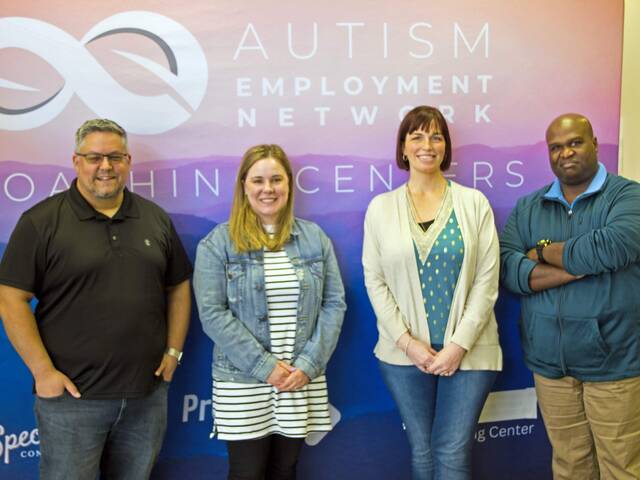For anyone who thinks people stopped taking pride in their work, meet Robert Hester.
“You happen to have popped in on me at the same time I’m going to make my 100th package,” he told a recent visitor to his Monroeville Mall workplace, as Hester and a colleague placed a product called Movemints into bags at an apparently rapid pace.
“We literally just started this an hour ago,” he boasted. “What you can say? You can’t say Progress City without first saying the word ‘progress.’”
The Monroeville resident’s reference was to Progress City LLC, a South Side-based team of consultants who help individuals with autism spectrum disorder become better integrated into the community, with a specific component emphasized through the nonprofit’s Autism Employment Network.
Founded in 2019 as a pilot project, the network has “really has taken over almost everything that we do,” according to Progress City CEO Bryan Kiger, with multifunctional employment coaching centers established in Monroeville and the South Side, and in Hempfield at Westmoreland Mall.
Each mall site features a SpectroDolce Confectionery, which sells gourmet chocolates and sweets while giving people with autism a place to gain work experience and job-readiness skills. The network also partners with regional businesses — including Movemints, which produces candies designed as a breath-freshening way to help seat teeth aligners — to package items for shipment.
And inside the Monroeville location are some specialized receptacles for growing greens in nutrient-rich water, the foundation of what Kiger hopes will be a major hydroponics operation.
“This is just for us to get used to it. We have a request in with the USDA to do a huge, 10,000-square-foot indoor farm,” he said about U.S. Department of Agricultural approval.
‘Surround an individual with support’
Such endeavors go beyond merely creating jobs.
“Our goal with the coaching center model is to be able to fully surround an individual with support,” Kiger explained. “We have learned through experience that if you just focus on job search, if you just focus on employment, you’re doing it in a vacuum and you’re not meeting the full needs of the individual.”
For example, autism spectrum disorder can manifest itself by limiting the ability to communicate, interact and/or pay attention, according to the U.S. Centers for Disease Control and Prevention.
“We have people who have been employed for years, but they keep jumping around because of the social piece that they struggle with,” Kiger said.
“Part of our mission, too, is to do training for employers to help them understand autism, really kind of demystify it,” he continued. “The key is to find an employer that’s truly interested in inclusion. If it’s an employer who’s just looking for bodies to fill open positions, it’s not going to work.”
Kiger’s wife, Angela, concurs with the importance of taking a holistic approach.
“It’s not just a one-size-fits-all kind of solution. We definitely focus on employment as kind of the key aspect of who we are and what we do, but there are other pieces to it, too,” she said. “We have the ability to take a really individualized approach, through understanding somebody’s interests, skills, abilities and talents, but also the needs and challenges.”
Angela has a bachelor’s degree in psychology and serves as a Progress City executive vice president, with duties varying from human resources to connecting with outside employers and overseeing vocational services.
“We’re also working with transition-age students,” she said, including high schoolers at Franklin Regional, Norwin, Penn-Trafford and Penn Hills. “We started out working with adults, but also found that the schools are looking for partners to be able to prepare people for that next step for employment.”
‘Something we can solve’
Her husband founded Progress City in 2017 after working in social services, direct care and related fields.
“Many years ago, I did work with an individual with autism. I went to school with him every day, kindergarten through second grade,” he said. “It was lumped in with behavioral health, but it wasn’t dealt with in a way that was really individualistic for him. So that kind of always stuck with me.”
Then he learned of employment issues facing the nation’s 5.6 million autistic adults. Studies estimate 75% to 90% are unemployed or underemployed, and nearly 50% of 25-year-olds with autism never have held a paying job despite having the skill sets and expertise to excel in the workplace, according to Progress City.
“I started working with a few individuals to understand what the true needs are, and my passion for innovation kind of kicked in,” Kiger said, motivated by the thought: “Here is something we can solve.”
He began the Autism Employment Network with a business on Route 22 in Monroeville, the Kigers’ home municipality.
“It was already a candy and ice cream shop. We took it over and turned it into SpectroDolce,” Bryan said, with Hester proud to be the first employee.
Having outgrown that space, the operation moved to its new 4,000-square-foot home in November.
Kiger explained the intent of placing coaching centers at malls.
“We really want to normalize getting support. We want to make it accessible for individuals, but we also want to make it accessible for the parents of these adults,” he said. “We try not to do the clinical feel to it.”
The centers include rooms in which clients can meet privately with clinicians and therapists. In Monroeville, a former bank vault serves such a purpose, adding a fun fact for everyone involved.
‘Everyone here wants to work’
For Heather Szurszewski, serving as director of program operations has been a fulfilling career change following her work in restaurant management.
“I was looking for something more meaningful, something that I could give back to the local community, something that mattered to me,” she said. “And somehow, that worked out where it was a perfect fit.”
Having earned her degree in hospitality management, she learned to supervise employees based on their various skills and needs, corresponding with the Autism Employment Network’s philosophy.
She cited another bonus.
“Everyone here wants to work,” Szurszewski said. “It’s just amazing. Not only can I use my skills, but I’m working with people who are excited to work. And it’s exciting to tell them, ‘You can do anything you want.’ Some of these people have never heard that before.”
Hester is among the people who have taken such encouragement to heart, serving as an ambassador for the positives offered by the Autism Employment Network.
His connection to the network came through Brian Kluchurosky, a Progress City executive vice president who several years ago founded Pittverse Magazine, an online publication with content produced exclusively by adults diagnosed with autism spectrum disorder.
As a Pittverse photographer and writer, Hester has enjoyed his assignments for the boosts they provide to his self-esteem.
“It’s an opportunity for me to be around high-profile people,” he said. “And the more high-profile people you’re around, you’ll feel more like you’re a high-profile person, yourself.”
For more information, visit autismemploymentnetwork.com.















